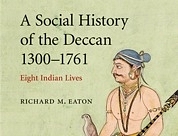
A Social History Of The Deccan
A Social History Of The Deccan, 1300-1761: Eight Indian Lives, Richard Eaton, Cambridge University Press (2005)
In A Social History Of The Deccan, 1300-1761: Eight Indian Lives, historian Richard Eaton does a great job of telling a good tale. Eaton picks eight historical figures whose personal stories (at times sparse) animate the foreground while history itself flows in the background. The nitpickers can always argue whether these were the eight best characters to pick. Others may wonder if political correctness influenced his choice: an Andhra warrior (or two), a Sufi saint, an Ethiopian slave, an Iranian nobleman, a Maratha queen and a non-brahmin Sant representing almost every demographic.
Yet this choice of characters probably says more about the melting pot that was the Deccan of the 14th-17th century than all the other books we’ve read. While history is written by victors, social history of the kind Eaton has pursued reveals history to be far more textured and nuanced. For instance, the commonly-held view that the ‘Hindu kingdom’ of Vijayanagar was the bulwark against the onslaught of Islam does not pass muster here. The discussions on the influence of Persia and Central Asia on the Deccan, the role that trade and politics, more than religion, played in shaping history and the deep linguistic roots of South Indian society challenged many previously-held assumptions for me.
This week’s ‘Good Books’ column is contributed by K. Srikrishna